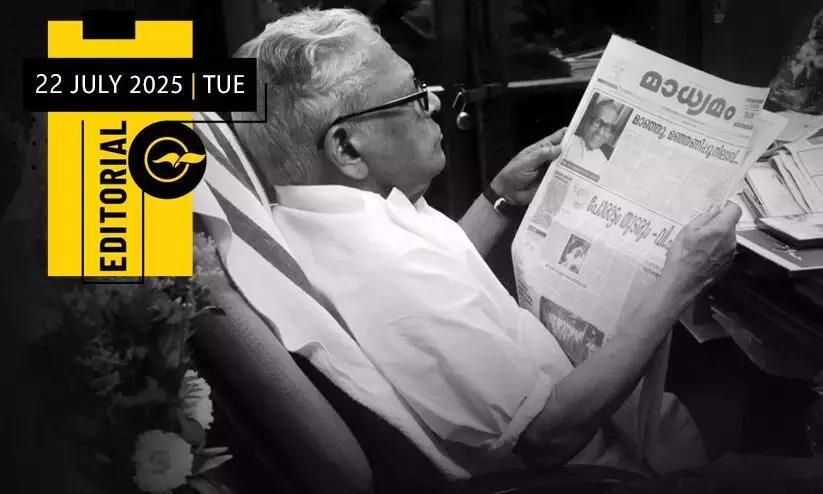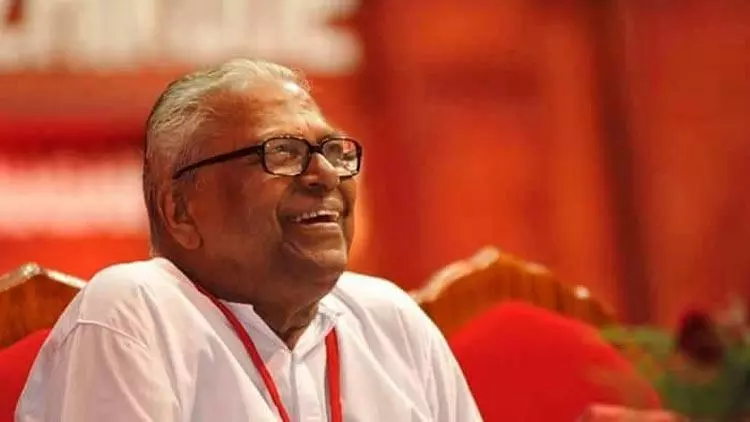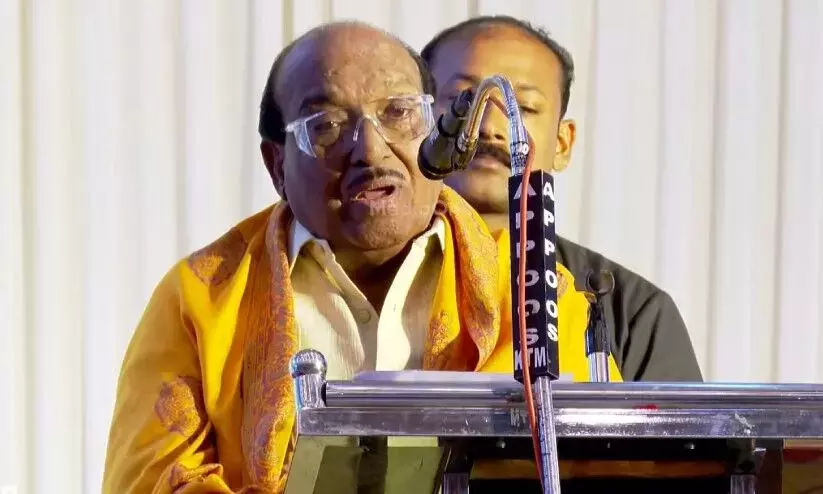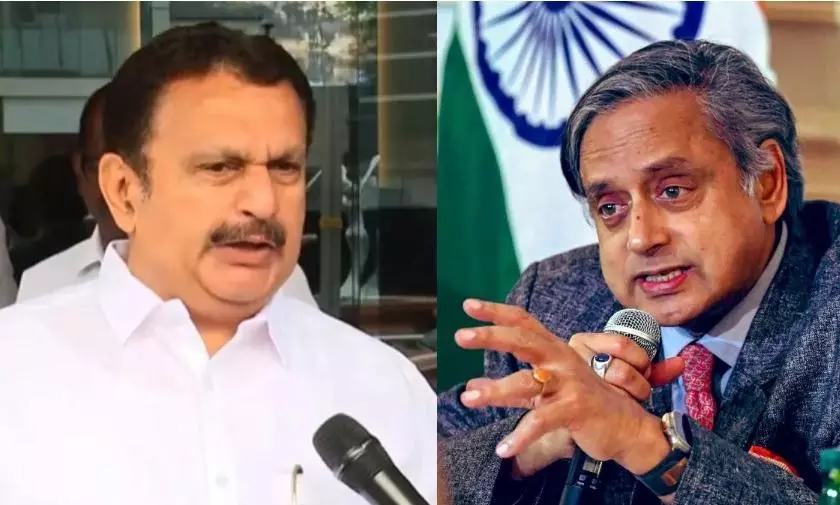
VS the only one
text_fieldsA towering figure who enriched his life through protest fronts has bid farewell. Velikkakathu Sankaran Achuthanandan — VS as he fondly called. — embarked on his final journey at the age of 102. His departure marks the end of a historic chapter shaped by protests and struggles that began even before the formation of united Kerala. He was the last link in the legacy of protests that shaped Kerala and gave it its unique identity; the last figure among those who carried the flag of Kerala’s defining struggles. He was the backstage warrior who prepared the party to realise the first Communist ministry in united Kerala. Of the 32 leaders who walked out of the undivided Communist Party of India's national council 61 years ago to form the new party, CPI(M), he was the last surviving member. Since that day, he became a revolutionary who dared to dare even the party leadership when principles warranted it. As Leader of the Opposition, he wielded the sword of people’s protest both inside and outside the Assembly. He was a brilliant Chief Minister who redefined the practicalities of parliamentary politics and created a new model of people-centric governance rooted in ideals. With a political life spanning eight and a half decades, V.S. was undoubtedly a rare figure in Kerala politics who etched a place in the hearts of the people through the string of protests. Alongside names like EMS., C. Achutha Menon, CH Mohammed Koya, K. Karunakaran, EK Nayanar, and Oommen Chandy—who defined and led the political direction of united Kerala—V.S. is a name that must be mentioned first. His interventions, both inside and outside the legislature, were immensely significant in shaping modern Kerala. Therefore, as VS bids farewell, it is the close of a historic chapter and the beginning of an undying legacy of courageous memories. To that historic figure, Madhyamam pays tribute!
It was always V.S. who appeared on public platforms with a clenched fist and raised hands, greeting the crowd. His entire life was marked by a spirit of protest — a style that never wavered. The clenched fist he raised upon beginning work at the Aspinwall Company at age 17 never came down. When he led the frontline battle in the Punnapra struggle and was imprisoned, the authorities made every effort to end that life altogether. But he survived the police bayonets and boots — his fist remained raised. As the country stepped into the dawn of independence, V.S. was in jail, and when he came out, the Communist Party had been banned, making public activity extremely difficult. Yet, he never gave up political activism; he dedicated his entire life to the Party. The Communist Party needed a leader like VS. That is why, even in his youth, he was inducted into the Party’s Central Committee. Around that time, he was also entrusted with the responsibility of leading the Party in Alappuzha. However, VS used those positions to serve the cause of ideological struggle. When senior leaders, including EMS, stepped down from the Party’s National Council, he too aligned with them — driven by that same spirit of struggle. Later, when internal conflicts persisted, even EMS stood on the opposite side. Even when VS got the opportunity to lead the state unit of the Party, he did not deviate from the ideological line. He intensified the struggle both within and outside the Party. It was through the continuity of those struggles that he became the Leader of the Opposition. That was a period when VS emerged as the face of people’s struggles in Kerala. Those struggles helped transform his image — from a Party leader with a Stalinist body language to a frontline fighter of the common people. Even amidst internal rifts within the Party, it was the people’s mandate that earned him his candidature and later elevated him to the post of Chief Minister.
As an administrator, VS can be described as one who presented a unique model that blended developmental vision with pro-people governance. He intervened in many people’s issues that 'Madhyamam' brought to focus. As a pro-people media outlet, we supported the movements led by VS without seeking any credit. He firmly argued that only such development that connects the land and its people on a par can lead the state towards sustainable and qualitative progress. He succeeded in transforming those arguments into powerful slogans against corruption. This was precisely the spirit reflected in the manifesto that was brought to the forefront when he came to power in 2006. Overcoming pressures from both within and outside the Party, he took small but significant steps towards implementing that manifesto — and in doing so, transformed it into a truly people’s government. The eviction of encroachments in Munnar and other areas are classic cases of this model; it was through VS’s determination that the state’s IT policy gained direction; it was during his tenure that several destructive forces in society — including the lottery mafia — were brought under control. At the same time, it was also during this period that the Beemapally shooting, in which the Kerala Police took the lives of six people, occurred. Just as many of VS’s stances created dissent within the Party, some of his controversial remarks—such as those concerning the academic performance of Malappuram’s students and demographic changes among minority communities—raised doubts and concerns within Kerala society as well.
There was a general expectation that VS’s government would see a continuation, although there was doubt as to whether his own party leadership desired it. In fact, VS’s tenure was a period marked by heightened internal conflicts within the Party. When those conflicts had a greater impact in the 2011 elections, the government lost by a narrow margin. Five years later, when the Party regained power riding on VS’s shoulders, he was sidelined with a Cabinet post as Chairman of the Administrative Reforms Commission. It wouldn’t be wrong to say that this was the least significant period in VS’s 35-year-long parliamentary career. It was from this point that the resolute political fighter known as VS began to step back. Yet, whether in presence or absence, VS continued to be remembered. From the very first day of his political life, VS firmly positioned himself as the ‘opposition’ to all ruling classes — and it is certain that he will be remembered in the future as one of the key chapters in Kerala’s political history.















